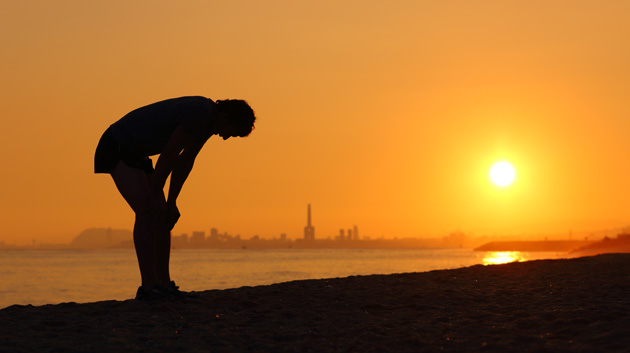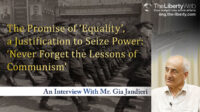Learn from Failures and Setbacks of Great Figures
What Makes People Rise to Extraordinary Heights?
Many people know the feats that great figures of the past accomplished, but do not know much about the failures and setbacks behind their glorious achievements.
This column focuses on the hardships that some great figures experienced..
Reverend Martin Luther King: “I am at the end of powers.”
Martin Luther King who delivered his famous “I have a dream” speech devoted his life to the struggle against racism. His achievements were published in many books and made into a movie in 2014.
It seems that no adversity could shatter Rev. King’s belief, but he actually wavered in his belief when confronted with various difficulties.
His church was set on fire and he himself was sentenced to jail many times. Amidst escalating threats of violence against not only himself, but also his family, Rev. King felt like giving up on everything. He was extremely exhausted and began to think of a way to leave the movement.
“I can’t go on any longer” – Rev. King cried in the kitchen of his home, deciding to take his problem to God.
“I am here taking a stand for what I believe is right. But now I am afraid. The people are looking to me for leadership, and if I stand before them without strength and courage, they too will falter. I am at the end of my powers. I have nothing left. I’ve come to the point where I can’t face it alone” (An excerpt from “Stride toward Freedom”).
“At that moment, I experienced the presence of the Divine as I had never experienced God before. It seemed as though I could hear the quiet assurance of an inner voice saying: ‘Stand up for justice, stand up for truth; and God will be at your side forever'” (An excerpt from “Stride toward Freedom”).
Three days later, when Rev. King visited a church to speak in front of the congregation, he received the news that his home was bombed. After he returned home to learn that his family was not hurt, he appealed to the furious crowd of several million never to resort to retaliatory violence.
“Remember, if I am stopped, this movement will not stop, because God is with the movement. Go home with this glowing faith and this radiant assurance” (An excerpt from “Stride toward Freedom”).
He could not have uttered such powerful words without experiencing the presence of the Divine. The hardships that Rev. King had to go through, and how strenuously he tried to rise above them, are beyond our imagination.
Sir Winston Churchill: “I cannot always live up to my father’s expectations.”
Winston Churchill, the former Prime Minister of the United Kingdom, once ranked first in “100 Greatest Britons,” a television poll conducted by the BBC. He was still revered by many Britons for his feat of protecting Britain from the invasion of Nazi Germany under Hitler. However, he was not on an elite track to top leadership of the country.
Winston Churchill’s father, Randolph Churchill, graduated from Eton College with brilliant records and became a cabinet minister. On the contrary, Winston performed poorly in his schoolwork so he had to go to Harrow School with lower level of difficulty. Even at Harrow, he remained in the lowest class. On the advice of his father, who thought he lacked the ability to learn, he decided to go to the Royal Military Academy, which he managed to pass on his third try.
Winston Churchill respected his father, but was saddened when Randolph told Winston something to the effect that:
“(You will) become a mere social wastrel, one of the hundreds of public school failures, and you will degenerate into a shabby unhappy and futile existence.” (From “Churchill Factor” by Boris Johnson)
Churchill remarked that he had only spoken to his father at most five times in his lifetime and that he had always felt that he could not live up to his father’s expectations.
However, after he entered the military academy, he concentrated on training himself to be a military serviceman. He volunteered to get postings to areas of conflict and wrote reports on the fighting for newspaper. His accounts of the war were later published in books, which received a high evaluation. While receiving military decorations many times, he pursued a career as a war correspondent and author. After he entered politics, he gained experience as a politician by serving as a minister to many areas of service.
Even when one door was shut, he never gave up and carved out his own path with his challenging spirit.
A Japanese philosopher, Kitaro Nishida: “If I could die in place of my sister…”
Kitaro Nishida is one of Japan’s prominent philosopher’s who established his own original and creative philosophy. His masterpiece, “An Inquiry into Good” was published in 1911 and the cumulative sales of the book remain the second highest after “Analects (of Confucius)” in the Iwanami paperback edition. The birth of Nishida’s philosophy was also unbearable sorrow-the repeated deaths of his family members.
When Kitaro was 13 years old, he lost his four-years-older sister to typhoid. She had always supported his dream and, even though a child, persuaded their father to let him go to a teacher’s school. In a letter to his friend, Ryokichi Yamada, Nishida recalled the time when she died, saying:
“I realized for the first time how sad it was that a loved one died. I shed tears alone without anyone seeing me. Child as I was, I sincerely wished I could have died in place of my sister.”
Kitaro’s father, Yasunori Nishida sadly also passed away without making amends in their troubled relationship.
His younger brother, Hyojiro, died in the Japanese-Russo war. His second daughter, Yuko, developed bronchitis and died at the young age of four. Between the ages of 48 and 50, Nishida was hit by one hardship after another. His mother, Tosa, who always protected and supported, him also died. In the following year, his wife, Kotomi, was struck by a cerebral hemorrhage and became bed-ridden. In the following year, his eldest son, Ken, died at the age of 22. Five of his eight children died before him. In spite of his diligent care, his wife passed away six years after she suffered her stroke.
What makes human beings rise to extraordinary heights?
People tend to think that great figures are simply destined to be great figures, and that they are special beings that live in a different world and are far removed from us, but it is not true. Even those who accomplished great feats that are regarded as their legacy for future generations went through many hardships and suffered greatly as human beings.
Great figures teach us the importance of persistence, belief, and taking a step forward even when we suffer so much that we think we cannot stand it anymore. It is the courage that makes human beings rise to extraordinary heights. The way these heros live give us hope in life and an ability to move forward in times of trouble.



















